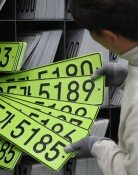Hyundai turns sugar cane fields into major auto plant in Brazil
Hyundai turns sugar cane fields into major auto plant in Brazil
Posted May. 17, 2012 23:19,
A four-lane highway running around 170 kilometers northwest from Sao Paulo, Brazil, passes through vast sugar cane farms on red clay land.
On May 7, a Dong-A reporter departed from Sao Paulo and drove down the road. After two hours or so, he arrived in the small Brazilian city of Piracicaba, where a Hyundai Motor plant is located.
Covering 1.39 square kilometers of land, the factory is a 30-minute drive from the citys entrance. Construction of the plant began in July 2010 by Hyundai Amco, an affiliate of Hyundai Motor, and is nearly complete.
Min Kyeong-hwan, head of Hyundais Brazilian plant, said, We are planting grass and trees around the factory to prevent red clay from generating dust, adding, Sugar cane fields have been turned into a Hyundai plant.
The plant will produce 150,000 compact cars a year, including the 1.0-liter Agave and another model with a 1.6-liter engine. The Agave is the Brazilian model of the Morning (the Pincanto for exports) produced by Kia Motors.
Min said, Considering Brazil-specific conditions in which cars run on gas, diesel and ethanol, the Agave will the first Hyundai car to be equipped with a flexible engine powered by ethanol along with other fuels.
Those in Piracicaba apparently await the completion of the plant. This is because the Hyundai plant will generate 5,000 jobs there - 2,000 at the plant and 3,000 at partner companies.
Piracicaba Mayor Barjas Negri said, If Hyundai Motor begins full-fledged production, about 20,000 jobs will be created if the number of jobs to be generated due to production is considered.
Hyundais market share in Brazil last year was a meager 3.3 percent. Given that Fiat, Volkswagen, GM, Ford and Mercedes Benz, which built their plants in Brazil decades ago, now occupy around 75 percent of the Brazilian car market, Hyundai`s achievement over the past several years is no small feat.
A sales manager at a Hyundai dealer in Morumbi Avenue, a leading office town in Sao Paulo, said, Well-heeled people here consider Hyundai cars luxurious like Mercedes Benzes.
The Brazilian plant holds special meaning for Hyundai Motor. After its Canadian plant closed due to poor performance in the late 1980s, the carmaker had been reluctant to set up overseas manufacturing bases. But it began establishing plants around the world from the early 2000s.
The Brazilian plant will increase the companys overseas plants to seven -- BRIC (Brazil, Russia, India, China) countries, the U.S., the Czech Republic and Turkey.
The completion of the Brazilian plant is the culmination of Hyundais global strategy. In 2002, Hyundai Motor Group Chairman Chung Mong-koo said, We will build our plants around the world, announcing his companys goal of becoming one of the world`s top five carmakers.
mint4a@donga.com wiseweb@donga.com
Headline News
- N. Korea launches cyberattacks on S. Korea's defense companies
- Major university hospital professors consider a day off each week
- Italy suffers from fiscal deficits from ‘Super Bonus’ scheme
- Inter Milan secures 20th Serie A title, surpassing AC Milan
- Ruling and opposition prioritize spending amid tax revenue shortfalls







